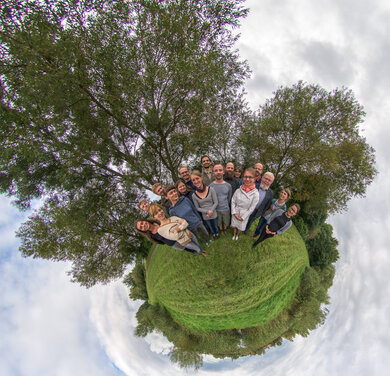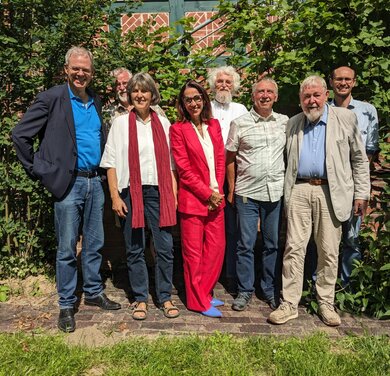The Succow Foundation
In 1999 Michael Succow founded this foundation with the prize money of the Right Livelihood Award, also known as the Alternative Nobel Prize, awarded to him in 1997. It is one of the first non-profit nature conservation foundations in the new German states. The Succow Foundation is an operational foundation and is active both nationally and internationally. Its guiding principles are: "Preserve, sustain, value".
Initially, the Succow Foundation was involved in the development and protection of national parks and biosphere reserves in post-Soviet countries with just a handful of employees. In the meantime, it has grown to more than 30 employees and engages in projects on four continents on climate protection, protected areas, sustainable land use and the promotion of young people. Thanks to the expertise of its employees and the foundation's board, it is well positioned in all landscapes - from peatlands to deserts.
The Succow Foundation maintains close cooperation with scientific institutions, above all with the Institute of Botany and Landscape Ecology at the University of Greifswald. It is a founding member and partner in the Greifswald Mire Centre established in 2015, and in the biosphere.center established in 2018. The foundation maintains Memoranda of Understanding with other national and international research institutions, such as the National Institute for Deserts, Flora and Fauna in Ashgabat, Turkmenistan.
In northeastern Germany, the Succow Foundation itself has more than ten areas in its care, among them several nature reserves. Most of these areas the Succow Foundation took over from the National Natural Heritage. Nature in these areas is to develop as undisturbed by human intervention as possible. Special nature experience offers are designed to convey an understanding of why these conservationist efforts are important.
The Succow Foundation has committed itself to the principles of good foundation practices of the Association of German Foundations (Bundesverband Deutscher Stiftungen e. V.). It is a member of the Transparent Civil Society Initiative (Initiative Transparente Zivilgesellschaft ) and the One-World Network Mecklenburg-Vorpommern (Ein-Welt-Landesnetzwerk Mecklenburg-Vorpommern).
1. Development and Support of World Heritage Sites, National Parks and Biosphere Reserves on the National and International Level
Encouraged by the success of the GDR’s national park programme around the time of the German reunification, we are facing the challenge to help create large-scale protected areas in the transformational countries of the former Soviet bloc. Here we place particular importance on achieving international certification as UNESCO Biosphere Reserves and World Heritage Sites, or National Parks according to IUCN criteria for as many of these areas as possible.
2. Protection and Development of Wetlands, especially Peatlands and Swamps
We owe this goal to the scientific work of our founder, who dedicated much of his life to the study and protection of peatland ecosystems on a worldwide scale.
3. Advancing the Concept of Nature Conservation through Scientific Research, Ecological Education and Public Relations Work
Information, illumination and the furthering of scientific research for the protection of nature – these are tasks that belong to a comprehensive conservation programme.
4. Promotion of International Relations in Nature Conservation and Ecology
In this time of economic globalisation it is necessary for conservation efforts to be organised on an international level, as well. Therefore, the majority of our projects takes place in the transformational countries of Eastern Europe and Central Asia.
Agency for Forests, Nature and Landscape, Liechtenstein
Baku State University, Aserbaidschan
Bernhard and Ursula Plettner-Foundation, Berlin
Büchting + Streit AG, Munich
Cassiopeia Foundation, Düsseldorf
Deutsche Bundesstiftung Umwelt (DBU), Osnabrück
Deutsche Gesellschaft für Internationale Zusammenarbeit (GIZ) GmbH, Bonn/Eschborn
Deutsche Umwelthilfe (DUH), Radolfzell
Dieter-Mennekes-Foundation, Kirchhundem
Environmental Foundation Michael Otto, Hamburg
European Commission / EuropeAid
Federal Agency for Nature Conservation
Federal Ministry for the Environment, Nature Conservation and Nuclear Safety, Berlin/Bonn
Fondation pour les animaux du monde, Liechtenstein
Gerda Techow Foundation, Liechtenstein
grassroots foundation, Warendorf
H.E.M. Foundation, Liechtenstein
Institute of sustainable development of lanscapes of the earth (DUENE e.V.), Geifswald
International Mire Conservation Group (IMCG)
International Academy for Nature Conservation, Vilm
Kreditanstalt für Wiederaufbau (KfW), Frankfurt am Main
Kurt-Lange-Stiftung, Bielefeld
Regional Government Authority of Liechtenstein
Leibniz Centre for Agricultural Landscape Research (ZALF), Müncheberg
Lindenbaum GmbH, Karlsruhe
Manfred Hermsen Foundation, Bremen
Marion Dönhoff Foundation, Hamburg
MAVA Foundation, Switzerland
Ministry of Agriculture, the Environment and Consumer Protection of Mecklenburg-Western Pomerania, Schwerin
Ministry of Ecology and Natural Resources, Azerbaijan
Nature and Biodiversity Conservation Union (NABU), Berlin
NaturSchutzFonds, Brandenburg
Norddeutsche Stiftung für Umwelt und Entwicklung (NUE), Hamburg
Seetel Hotel GmbH & Co. Betriebs – KG, Ahlbeck/Usedom
Sonnenwiese Foundation, Liechtenstein
Sparkasse Vorpommern, Greifswald
Studiosus Foundation e.V., Munich
Stiftung Feuchtgebiete (Wetland Foundation), Horst
Linking Tourism & Conservation (LT&C), Kolbjørnsvik/Norway
Federal Environment Agency, Dessau-Roßlau
National institute of deserts, flora and fauna of the Ministry of nature protection of Turkmenistan, Ashgabat
University of Urmia, Iran
University Town and Hanseatic City of Greifswald
vitalogue GmbH & Co KG, Munich
WERK3 - Agency for Advertisement and PR, Rostock
Special thanks to the donor family of the "Eva-Kleinn-Grant", which encourages young scientists who work in transition countries of the East for the protection of nature.
We thank everyone who supports our work once or permanently.
![[Translate to EN:] Banner Stiftung](/fileadmin/_processed_/b/c/csm_banner-stiftung_fee6c1c492.jpg)
![[Translate to EN:] Succow](/fileadmin/_processed_/b/9/csm_michael-succow_b7f832b637.jpg)


